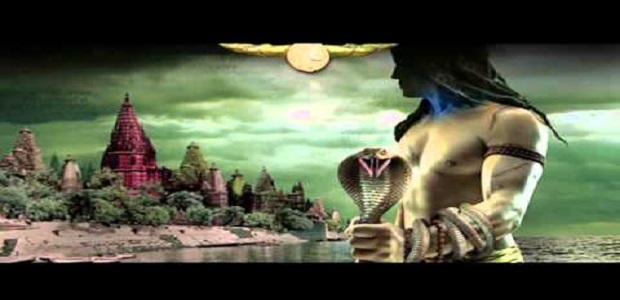The Oath of the Vayuputras is a finale to the three part epic written by Amish. The part fiction-part history work, revolves around the rise of the Great Lord Shiva, from a warrior of a small mountain tribe to a deity revered by the entire Indian nation (Bharatvarsh), even now.
[part one]
During the critical time, just prior to the impending civil war in Bharatvarsh (India), the good side is faced with a predicament. Both sides are almost through with war preparations. The good side, Shiva’s comrades, have a key player of the opposition that will tip the balance in their favor. Does one follow the rules to take the honorable path to victory? Or is a great end justifiable by questionable means?
…the excerpt…
To address the predicament faced by Neelkanth’s side, Kartik, Shiva’s younger son, voices his reasoning in front of the assemblage gathered in the Neelkanth’s private chambers.
‘… Sometimes, for the sake of the larger good, one has to do things that may not appear right at the time. Perhaps, a laudable end can justify some questionable means.’
Sati glared at her younger son. ‘Kartik, how can you think that a great end justifies questionable means?’
‘Maa, can we accept a world where the Somras continues to thrive?’
Ganesh finally spoke up. ‘Of course it is, maa.’
‘No, it is not,’ said Sati. ‘It is also about the legacy that we will leave behind, of how Shiva will be remembered. People from across the world will analyse every aspect of his life and draw lessons. They will aspire to be like him. Didn’t we all criticise Lord Bhrigu for using the daivi astras in the attack on Panchavati? The Maharishi must have justified what he did with arguments similar to what you’re advocating. If we behave in the same way then what will differentiate us from him?’
‘People only remember victors, didi,’ said Kali. ‘For history is written by victors. They can write it however they want. The losers are always remembered the way the victors portray them. What is important right now is for us to ensure our victory.’
‘Please allow me to disagree, Your Highness,’ said Gopal. ‘It is not true that only victors determine history.’
‘Of course, it is,’ said Kali. ‘There is a Deva version of events and an Asura version of events. Which version do we remember?’
‘If you talk about the present-day India, then yes, the Deva version is remembered,’ said Gopal. ‘But even today, the Asura version is well known outside of India.’
‘But we live here,’ said Kali. ‘Why should we bother about the beliefs that prevail elsewhere?’
‘Perhaps I have been unable to make myself clear, Your Highness,’ said Gopal. ‘It’s not just about the place, but also about the time. Will the Deva version of history always be remembered the way it is? Or is it possible that different versions will emerge? Remember, if there’s a victor’s version of events, then there’s a victim’s narrative that survives equally. For as long as the victors remain in command, their version holds ground. But if history has taught us one thing, it is that communities rise and fall in eminence just as surely as the tides ebb and flow. There comes a time when victors do not remain as powerful, when the victims of old become the elite of the day. Then, one will find that narratives change just as dramatically. This new version becomes the popular version in time.’
‘I disagree,’ dismissed Kali. ‘Unless the victims escape to another land, like the Asuras, they will always remain powerless, their experiences dismissed as myths.’
‘Not quite,’ said Gopal. ‘Let me talk about something that is close to your heart. In the times that we live, the Nagas are feared and cursed as demons. Many millennia ago, they were respected. After winning this war they will become respectable and powerful once again as loyal allies of the Neelkanth. Your version of history will then begin to gain currency once again, won’t it?’
An unconvinced Kali chose to remain silent.
‘An interesting factor is the conduct of the erstwhile victims in the new era,’ said Gopal. ‘Armed with fresh empowerment, will they seek vengeance on the surviving old elite?’
‘Obviously the victims will nurse hatred in their hearts. Would you expect them to be filled with the milk of human kindness? asked Kali, sarcastically.
‘You hate the Meluhans, don’t you?’
‘Yes, I do.’
‘But how do you feel about the founding father of Meluha, Lord Ram?’
Kali was quiet. She held Lord Ram in deep reverence.
‘Why do you revere Lord Ram, but reject the people he left behind?’ asked Gopal.
Sati spoke up on her sister’s behalf. ‘That is because Lord Ram treated even his enemies honourably, quite unlike the present-day Meluhans.’
Shiva observed Sati with quite satisfaction.
‘A man becomes God when his vision moves beyond the bounds of victors and losers,’ said Sati. ‘Shiva’s message has to live on forever. And that can only happen if both the victors and the losers find validation in him. That he must win is a given. But equally critical is his winning the right away.’
Gopal was quick to support Sati. ‘Honour must beget honour. That is the only way.’
Shiva walked to the balcony and gazed at the massive Kashi Vishwanath temple on the Sacred Avenue, and beyond it at the holy Ganga.
Everyone was poised for his decision.
He turned and whispered, ‘I need some time to think. We will meet again tomorrow.’
…………
(To live this journey, and experience the immensely beautiful and elegant storytelling of Amish, in his trilogy visit Flipkart and get your copies now!)
We will complete this three part post, following each with in-depth analysis and insights on how this can be related to the present world scenario and also few more intriguing excerpts from Amish’s third book, The Oath Of The Vayuputras.

































